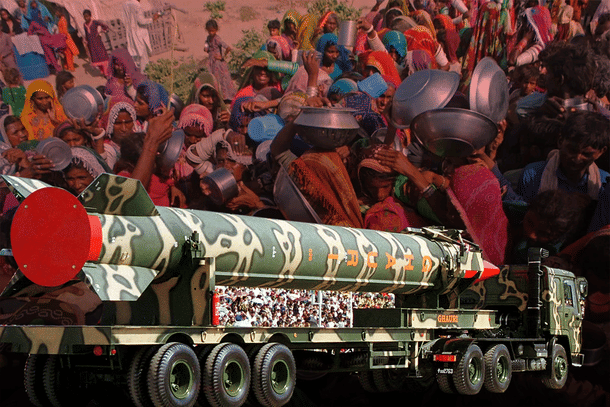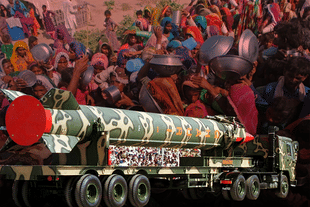World
Why Pakistan May Be About To Lose Its Atomic Arsenal
Sonali Priyadarsani
May 20, 2025, 01:09 PM | Updated May 21, 2025, 11:03 AM IST
Save & read from anywhere!
Bookmark stories for easy access on any device or the Swarajya app.


Pakistan's script is predictable: provoke India, escalate briefly, then hide behind nuclear threats. The Pahalgam massacre in April followed this playbook perfectly—until Operation Sindoor exposed the bluff.
As Indian strikes pummelled terror camps, Pakistan's generals desperately sued for peace.
But imagine a different ending to this story. What if Pakistan's next crisis finds it unable to brandish nuclear weapons? Economic collapse, water wars and ethnic fragmentation may soon force the world's sixth-largest nuclear power into an unprecedented choice: abandon the bomb or watch the state disintegrate.
The economics of existential deterrence
Consider the mathematics of nuclear maintenance. Pakistan's 165 nuclear warheads cost roughly $2 billion annually—a fifth of its entire defence budget.
For a country with an external debt of $125 billion (over half its GDP) and foreign reserves so depleted it must borrow to service existing loans, this burden grows heavier each year. The IMF's 23rd bailout programme comes with conditions that squeeze military spending further.
Picture Pakistan in five years: inflation raging, basic services collapsed, provinces demanding resources. Would any government survive politically while spending billions on weapons it claims never to use? The nuclear programme's opportunity cost becomes impossible to ignore when schools lack teachers and hospitals lack medicine.
Running dry
India's suspension of the Indus Water Treaty in response to continued Pakistani terrorism adds another layer of pressure.
Nuclear facilities require enormous amounts of water for reactor cooling and uranium processing. Pakistan's nuclear infrastructure, concentrated along the Indus basin, would be particularly vulnerable to water stress.
By maximising its use of the six rivers covered by the treaty, India can legally reduce Pakistan's water access without violating international law.
Projects like the Shahpur Kandi barrage ensure "not a single drop" of India's share flows to Pakistan. As climate change intensifies water scarcity across the Indian subcontinent, Pakistan's nuclear installations may become the first casualties of hydrological warfare.
The centre cannot hold
Perhaps most dangerously, Pakistan's fragile federation shows signs of coming apart. Punjab's dominance breeds resentment in Sindh, Balochistan and Khyber Pakhtunkhwa. Balochistan simmers with insurgency; Sindh chafes at resource extraction without proportional returns. Even Pakistan-occupied Kashmir faces demographic engineering designed to dilute local voices.
Pakistan's nuclear command structure, concentrated in Punjab's military establishment, depends on centralised control. In a fracturing state, provinces gaining autonomy would prioritise hospitals and schools over warhead maintenance. Who controls the nuclear codes when the centre no longer holds?
Fragmenting atoms
Now imagine the endgame: a Pakistan so fractured that no central authority can credibly control nuclear assets. Competing provincial governments might claim warheads; institutional breakdown could leave facilities unguarded; ethnic militias might seek atomic weapons as ultimate insurance. The nightmare scenarios multiply when the nuclear chain of command fragments along ethnic and provincial lines.
The international community would face an urgent choice: intervene to secure loose nukes or risk nuclear terrorism. Unlike North Korea's isolated programme, Pakistan's arsenal sits astride one of the world's most volatile regions. When—not if—Pakistan's contradictions reach a breaking point, the global consensus for denuclearisation may finally override sovereignty concerns.
Pakistan stands at a crossroads it has long avoided confronting. Current trends suggest the country must soon choose: preserve its nuclear arsenal or preserve its federation. Economic mathematics, water stress and centrifugal politics are making both increasingly impossible.
The irony would be fitting. Pakistan's bomb, built to ensure the state's survival against India, may become the instrument of its dissolution. The subcontinent's most dangerous atomic programme could end not with a bang, but with Pakistan's own inevitable whimper.
Sonali Priyadarsani is a Policy Consultant and has interests in analysing the intersection between law and policy.





